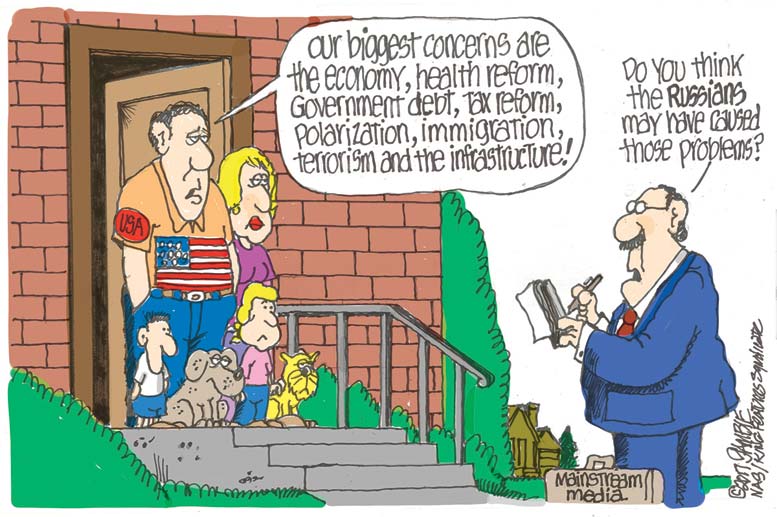
It's one of the enduring misconceptions of the Trump-Russia affair. During the 2016 Republican convention, the story goes, the Trump campaign weakened a critical passage in the GOP platform to go easy on Russia. The Trump team acted, according to this narrative, as part of an ongoing conspiracy with Vladimir Putin to help Donald Trump win the White House.
But that is not what happened.
In fact, an already-tough portion of the Republican platform dealing with Russia was strengthened, not weakened, at the GOP convention. Here is what took place:
The original draft of the platform -- it has never been released publicly, but an insider shared the relevant passages with me -- had strong language on Russia, and in particular on Russian aggression in Ukraine. Warning of "a resurgent Russia occupying parts of Ukraine and threatening neighbors from the Baltic to the Caucasus," the platform vowed to increase U.S. pressure on a "reckless" Russia.
"We will meet the return of Russian belligerence with the same resolve that led to the collapse of the Soviet Union," the platform said. "We will not accept any territorial change in Eastern Europe imposed by force, in Ukraine or elsewhere, and will use all appropriate measures to bring to justice the practitioners of aggression and assassination."
It would be hard to call that a pro-Putin statement. Every word of it stayed in the final platform.
When the platform committee met before the GOP convention in Cleveland, one delegate out of the 100 on the committee, a Texas political activist named Diana Denman, proposed an amendment. Denman, who came to the convention as a Ted Cruz delegate but later switched her support to Trump, was interested because she had traveled to Ukraine as an international election observer in 1998 and has ever since "kept an eye on the emerging democracies," she told me in a conversation last March.
Denman's amendment praised the Ukrainian people and said they deserved the greatest U.S. assistance. "We therefore support maintaining (and, if warranted, increasing) sanctions against Russia until Ukraine's sovereignty and territorial integrity are fully restored," Denman's proposed amendment read. "We also support providing lethal defensive weapons to Ukraine's armed forces and greater coordination with NATO on defense planning. Simultaneously, we call for increased financial aid for Ukraine, as well as greater assistance in the economic and humanitarian spheres, including government reform and anti-corruption."
Denman's amendment also contained an introductory paragraph filled with a lot of generic rhetoric. When she proposed the amendment, a Trump national security aide named J.D. Gordon, who was in the room with the platform committee, wanted to edit it. According to Denman, Gordon got on the phone, saying he was calling "New York" to discuss possible changes.
At the behest of the Trump campaign, the platform committee took out the throat-clearing introduction and changed Denman's reference to "lethal defensive weapons" for Ukraine to a pledge to provide "appropriate assistance to the armed forces of Ukraine." They left in Denman's language on NATO and on continued and possibly tougher sanctions on Russia.
The final, Trump-approved passage read: "We support maintaining and, if warranted, increasing sanctions, together with our allies, against Russia unless and until Ukraine's sovereignty and territorial integrity are fully restored. We also support providing appropriate assistance to the armed forces of Ukraine and greater coordination with NATO defense planning." That was the amendment the committee approved.
In the end, the platform was strengthened with language pledging ongoing and possibly increased sanctions. It was also made tougher with Denman's reference to "NATO defense planning," which had not been in the original draft. Finally, Denman's lethal aid suggestion was changed to "appropriate assistance to the armed forces" -- a change that put the specific promise of U.S. aid to Ukraine's armed forces in the platform where it had not been originally.
"The platform ended up tougher than it started, compared from the beginning to the end," Denman told me, although she added she still believes her lethal aid provision should have been included in the final document.
So how did the "Trump weakened the GOP platform" meme get started? Seizing on the Trump campaign's entirely defensible change of Denman's "lethal defensive weapons" to "appropriate assistance" -- neither of which was in the original GOP draft platform -- some Democrats, Republican NeverTrumpers and their allies in the press portrayed the platform meeting in Cleveland as Donald Trump selling out the GOP to Vladimir Putin.
They were helped in their efforts by a July 18, 2016 story in the Washington Post with the headline, "Trump campaign guts GOP's anti-Russia stance on Ukraine" -- a blatantly false description of events.
The narrative spread. "The same month that Trump denied Putin's role in Ukraine, his team weakened the party platform on Ukraine," Democratic Rep. Andre Carson said during a House Intelligence Committee hearing in March. "This was the same month that several individuals in the Trump orbit held secret meetings with Russian officials, some of which may have been on the topic of sanctions against Russia or their intervention in Ukraine. Now, this is no coincidence, in my opinion."
In addition to being factually wrong, that storyline seems particularly out of place coming from Democrats, because the 2016 Democratic platform, while pledging to "stand up to Russian aggression," said nothing about U.S. sanctions against Russia or about U.S. aid to Ukraine's armed forces, both of which were in the Trump-approved Republican platform.
Needless to say, the Democratic platform said not a word about lethal aid to Ukraine.
Yet Democrats, along with GOP NeverTrumpers, press on -- and it appears the platform narrative, wrong as it is, will not die. That won't change until people begin to look at what actually happened at that Republican platform meeting in Cleveland.


 Contact The Editor
Contact The Editor
 Articles By This Author
Articles By This Author